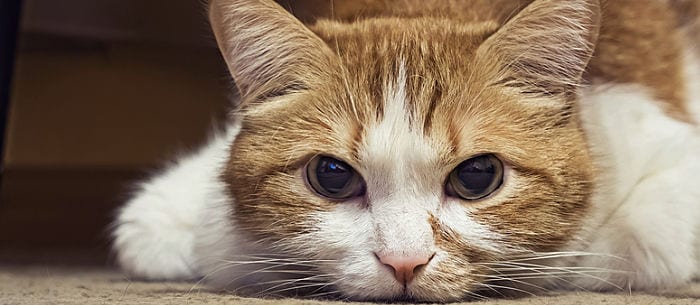You treat your cat like a member of your family, so learning he has feline lymphoma can be quite scary and overwhelming. But by arming yourself with all the facts, you can make sure that you’re prepared to take on any medical challenge that may affect your furry friend. Here’s everything you need to know about lymphoma in cats.
What Is Feline Lymphoma?
“Feline Lymphoma is one of the most common types of cancer found in cats,” says Dr. Carol Osborne, a veterinarian at Chagrin Falls Veterinary Center in Ohio. “This type of cancer is usually associated with the Feline Leukemia Virus (FeLV).”
Thankfully, the rate of FeLV has decreased drastically over the past few years, due to the rise of vaccinations and necessary testing. This form of cancer can also be associated with some types of Feline Immunodeficiency Virus (FIV) and even secondhand smoke, as your cat may ingest carcinogens from smoke that lands on his fur, says Dr. Osborne.
How Common Is It?
Cancer in cats is not that common, but lymphoma is one of the most common forms of cancer in cats. “It is estimated that 1 in 500 cats will be diagnosed with lymphoma,” says Dr. Lee Herold, the chief medical officer at DoveLewis Emergency Animal Hospital in Portland, Oregon. “Lymphoma can occur in many parts of the body, but the most common location in cats is within their stomach and intestines, a condition called gastrointestinal lymphoma,” she adds.
What Are the Symptoms?
Unfortunately, there are no particularly striking symptoms of this illness. If your cat is sick with this disease, the signs will be general and may be subtle. “Because gastrointestinal lymphoma is the most common form of this cancer, symptoms you might see in your cat are quite general and include weight loss, vomiting, diarrhea and loss of appetite,” says Dr. Herold.
“In the less aggressive forms of lymphoma, symptoms can be around for many months before a diagnosis is made. In more aggressive forms, symptoms may be observed for only a short period of time before a diagnosis.” In short, your kitty might seem to be under the weather.
How Is It Diagnosed?
As always, you should keep track of any changes in your pet’s behavior. If your cat is experiencing the above symptoms, you should take her to your vet to get checked out. It may even be helpful for you and your pet sitter to keep a written record of any potentially alarming symptoms, as you can easily refer to these notes while you’re at your vet’s office.
According to Dr. Osborne, your vet will make a diagnosis by evaluating your cat’s symptoms and history and performing blood tests, urine tests, x-rays and even ultrasounds. But usually a biopsy is needed to make a definitive diagnosis of feline lymphoma cancer, she explains.
If and when your vet diagnoses your cat with lymphoma, she will stage the disease — assess how far it has advanced — to determine the severity of the cancer. Your vet will determine the stage through a series of tests, much the same way as she diagnoses the disease.
What Types of Treatments Are Available?
“Unfortunately this cancer can shorten a cat’s life,” says Dr. Herold. “Lymphoma does not have a cure, but there are treatment options that can produce remission and extend survival time while still maintaining a good quality of life for your cat.”
According to Dr. Herold, common treatments for gastrointestinal lymphoma include oral chemotherapy medicines that you can give your kitty at home and injections that you would bring your cat to the vet for. But radiation and surgery may be options, too, says Dr. Osborne. Lymphoma in other locations are usually treated in the same way.
However, the specifics depend on your cat’s overall health, the stage of her cancer and other details that your vet will discuss with you.
Your vet may recommend alternative, natural treatments, as well. According to Dr. Osborne, natural treatments for lymphoma in cats can include nutritional therapy, oral and injectable vitamins, glutathione (an antioxidant), herbal preparations and immunotherapy.
What Is the Prognosis?
If your cat is diagnosed with lymphoma, her prognosis will depend on many factors that only your vet can determine. According to Dr. Osborne, survival time can vary from a few months to over a year in some cases. But she stresses that cats who are also positive for FeLV have a particularly poor prognosis.
While the news isn’t necessarily good, it’s comforting to know that in many cases your cat can get treatment that may extend his life and make him more comfortable. And, if you feel particularly overwhelmed by any health problems your kitty may be having, you can always reach out to a pet parent support group at a veterinary clinic or hospital.
Worried your sick cat may need professional help? Check out 11 Signs It’s Time for a Trip to the Vet.
Margie Mars is the mother of eight and oma of three. She also owns a chocolate Lab with OCD. Margie writes for several top parenting sites on family, pet and health topics, and specializes in attachment parenting and autism. She lives with her family in Oregon.
* This article is for general informational purposes only. It is not intended nor implied to be providing medical advice and is not a substitute for such advice. The reader should always consult a health care provider concerning any medical condition or treatment plan. Neither Care.com nor the author assumes any responsibility or liability with respect to use of any information contained herein.



